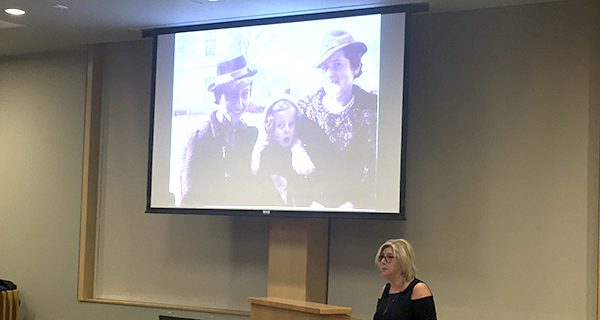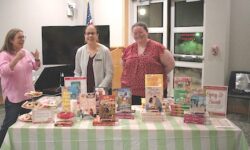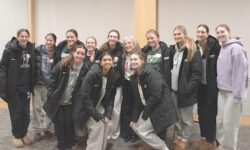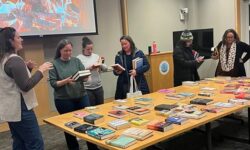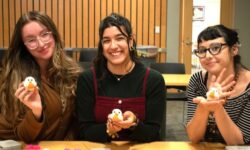[ccfic caption-text format="plaintext"]
By Katrina Margolis
Hometown Weekly Reporter
On Tuesday, March 21st, the Westwood Public Library hosted Janet Singer Applefield. A mother and a grandmother, graduate of Boston University’s Masters in Social Work program, and a clinical social worker, Applefield is an incredible woman without knowing her childhood story.
However, once she shares that story, her success becomes even more remarkable.
Applefield was born in a small town outside Krakow shortly before World War II broke out. “Throughout my childhood, my name was changed three different times,” she began. “Also, my appearance had a lot to do with my survival. I was blonde. I had certain features and I fit the profile of an Aryan child.” Applefield and her father both survived World War II and the Holocaust, and Applefield is committed to spreading her story and fighting against the bigotry and hatred that led to what happened.
One of the most incredible things about Applefield’s history is that unlike many other Holocaust survivors, her family was able to save a number of photographs from her youth, making her story that much more poignant.
“I was just four years old when the war started but I remember certain events,” Applefield recalled. “I remember seeing an airplane that was shot. It started to burn and it crashed. And I also remember having to jump off a wagon because there were planes overhead shooting at us.” When Germany attacked Poland, her family moved to Russia. After being told that in order to stay, they would have to become Russian citizens, her family returned to Poland. In retrospect, a mistake, Applefield admits. “When we returned, the Jews were made to live in the ghetto. This ghetto was open - it didn’t have any walls around it. Every day, there were deportations, some people were taken to the Jewish cemetery and shot. My parents made the decision that we would try to escape,” she said. They managed to get to the train station and escape to a smaller village outside of the city.
There was then an order that all of the Jews had to report at a particular place outside of Krakow. “My parents were desperately trying to find someone who would be willing to take me and hide me. They were able to convince a woman, named Maria - she was a nanny to one of my cousins - and she agreed.” Figuring they would have a better chance of survival splitting up, her parents went in separate ways after leaving their daughter with the nanny. They promised they would return for her. Applefield was passed from one person to another until the end of the war, when she was taken to a refugee camp. A woman started an orphanage for all of the children who didn’t know where their parents were, or if they would even survive. Applefield stayed there until one day, her father found her. “When I first saw my dad, I was scared of him because he looked like a skeleton. He was very sick and couldn’t visit every day,” she shared.
Once her father got better, he decided that they had to leave. He had one brother in Palestine and another in America. “And he said to me, where do you want to go? And I said, ‘I want to go to America,’ because I heard money grew on trees. It took about two years. March 1947, we sailed on a marine boat,” Applefield recalled. “I remember loving vending machines. Because I would put a nickel in and get a Milky Way. I also loved Jello; I had never seen it before.”
Applefield’s father married an American woman, and they were able to stay in the United States. She finished high school, went to college, got married at 19, and finished her college degree after promising her parents she would. “Today, I’m very proud. I had three children and five grandchildren. When I’m not longer here, I know that my daughter, son or my grandchildren will tell my story,” she said.
Her story will live on through her own family, and through all those she tells. Her work with Facing History In Ourselves helps to open the eyes of children and people everywhere as to what they can do when hatred has run wild.





